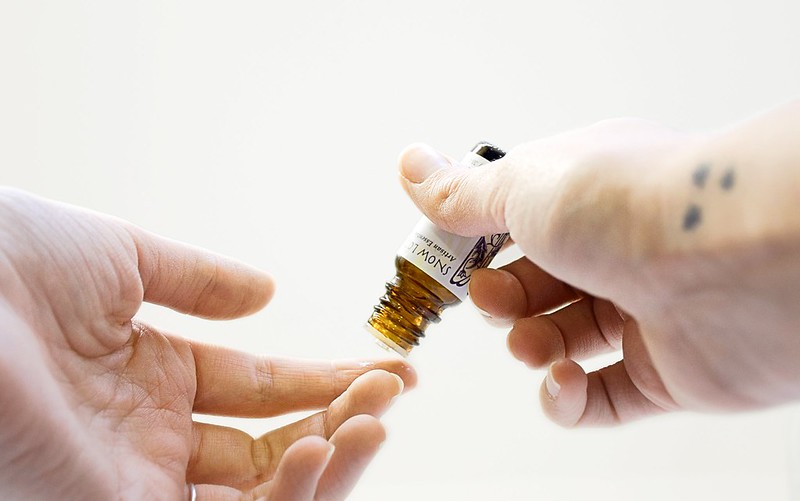 While I’d argue that the only truly essential oil is olive oil, there are dozens of plant-derived “essential oils” that are sold used commercially for health-, beauty-, and food-related purposes. In this case, “essential” refers to the essence of the plant’s aroma, and are not a statement regarding their importance to your health or well-being. Essential oils have been popular for decades but usage has exploded through wellness influencer endorsement combined with multi-level-marketing businesses that have driven awareness and use. While essential oils are generally considered safe, even harmless, by consumers, a number of adverse events have been reported by their use. Vaporizing them, for example, releases volatile organic compounds into the air that can worsen asthma symptoms. Some essential oils contain pro-convulsant compounds, which, when inhaled, have been associated with induced seizures. Now a new study examines the association of essential oil exposure with seizure in patients who presented to hospitals with new or breakthrough seizures.
While I’d argue that the only truly essential oil is olive oil, there are dozens of plant-derived “essential oils” that are sold used commercially for health-, beauty-, and food-related purposes. In this case, “essential” refers to the essence of the plant’s aroma, and are not a statement regarding their importance to your health or well-being. Essential oils have been popular for decades but usage has exploded through wellness influencer endorsement combined with multi-level-marketing businesses that have driven awareness and use. While essential oils are generally considered safe, even harmless, by consumers, a number of adverse events have been reported by their use. Vaporizing them, for example, releases volatile organic compounds into the air that can worsen asthma symptoms. Some essential oils contain pro-convulsant compounds, which, when inhaled, have been associated with induced seizures. Now a new study examines the association of essential oil exposure with seizure in patients who presented to hospitals with new or breakthrough seizures.
The study
This was a prospective evaluation of patients by Thomas Mathew and colleagues, examining patients who presented to four Indian hospitals between 2014 and 2018. Participants either needed to present with a first episode of a seizure, or a new seizure in individuals with pre-existing epilepsy who had recent exposure to essential oils. The researchers defined two types of seizures:
- Essential oil-induced seizures (EOIS) occurred after exposure to an essential oil where there was a temporal relationship, and no previous history of seizure and no recurrence after stopping exposure.
- Essential oil-provoked seizures (EOPS) occurred in persons with epilepsy or epilepsy syndrome, where the seizure occurred after exposure to an essential oil, and there was no other obvious cause for the seizure (e.g., not taking medication).
Over a four year period, 55 patients were identified out of 350 screened who met the definition of essential oil-related seizure. Twenty-two were EOIS and 33 were EOPS. The group was roughly split male to female, and the age ranged from 8 months to 77 years. Both eucalyptus oil and camphor oil were implicated, and the modes of use included topical (most common), inhalation, and ingestion (least common). Balms containing both camphor and eucalyptus were identified, as well as pure oils containing one or both ingredients. (These are the same active ingredients found in products like Vicks Vapo-Rub, but I have no idea if the products identified in the study were the same.) The paper gives a series of vignettes; here is one so you get the flavour of the cases:
A 12-year-old male was asked by his father to take steam inhalation with a balm containing 4.7 % camphor and 1.2 % eucalyptus for a common cold. Five minutes into inhalation he had a generalized tonic-clonic seizure. His MRI brain and EEG were normal. He was advised to avoid any exposure to essential oil containing products. The boy was followed up for a year with no recurrence of seizure.
The average time to seizure onset varied: 30 minutes to 24 hours after topical application, 2 minutes to 30 minutes after inhalation, and 30 minutes to 6 hours after ingestion. No one in the EOIS group has a subsequent seizure after discontinuing the EO. 94% in the EOPS group remained seizure-free during follow-up, continuing on their existing anti-epileptic medications. Amazingly, some patients in the EOPS who where chronically using essential oils could reduce the number and dosage of their anti-epileptic medications after eliminating exposure to essential oils.
Implications for essential oil users
Plant-derived essential oils may be naturally-sourced, but their concentrated forms can be used in ways and in amounts that are far from “natural”. Essential oils like eucalyptus, camphor, rosemary, thuja, sage, spike lavender, and turpentine have pro-covulsant properties due to their chemical components. In this study, camphor and eucalyptus, commonly used essential oils in India, were found to be associated with seizure occurrence in 55 cases. While cause cannot be definitively proven, it is not likely there will be prospective, blinded trials to further clarify this relationship. In light of these findings, it is probably prudent for those with a history of seizures or epilepsy to avoid use of pro-convulsant essential oils, particularly camphor and eucalyptus. For those without any epilepsy or seizure history, using essential oils with caution, and avoiding ingestion or excessive doses should minimize any risk of these rare but potentially serious adverse events.
Photos from flickr users Honolulu Media and 1Day Review used under a CC licence.

